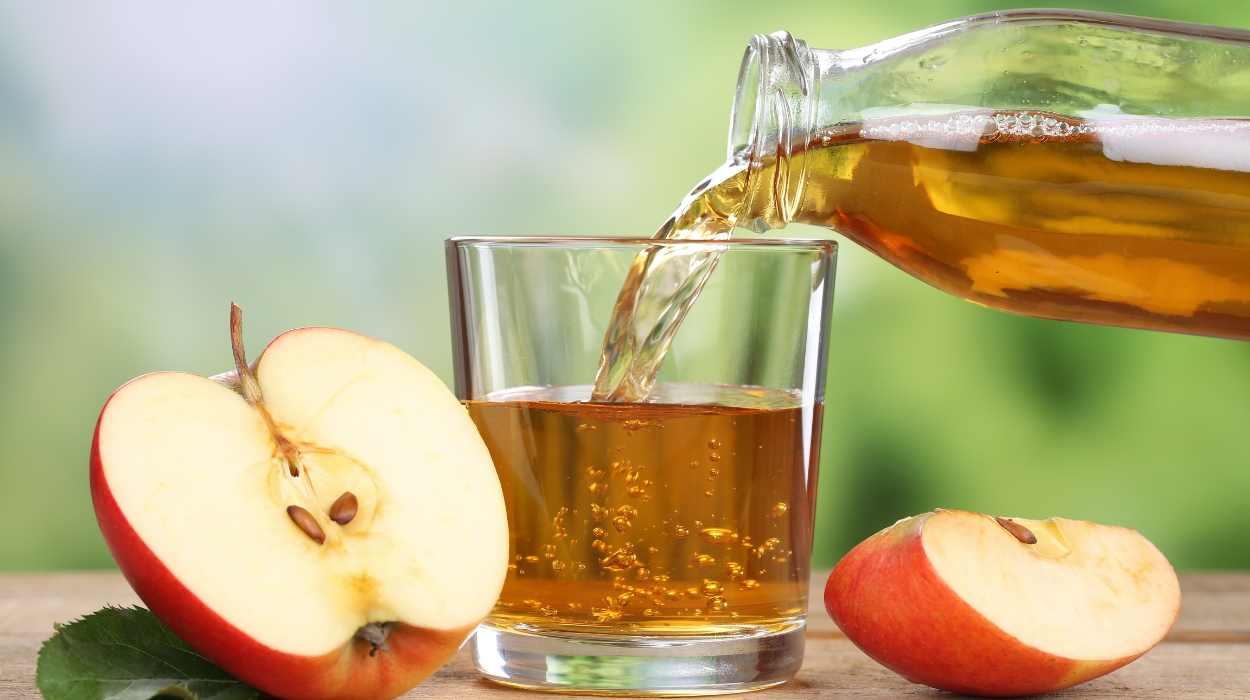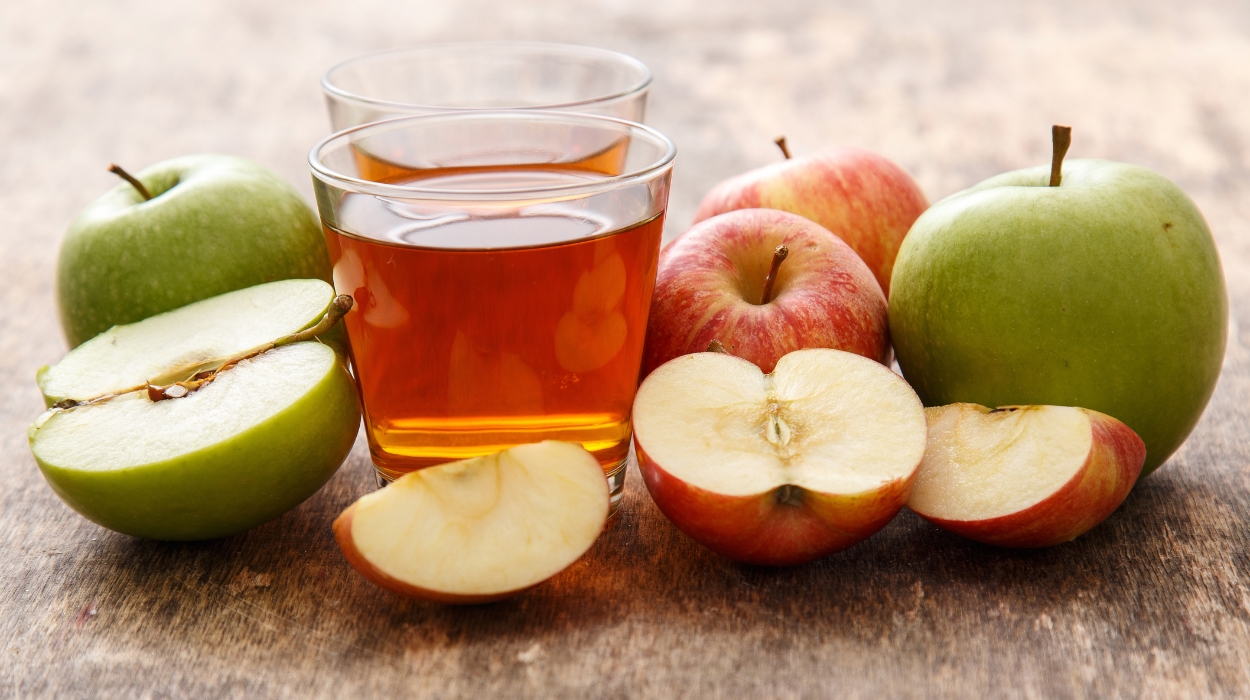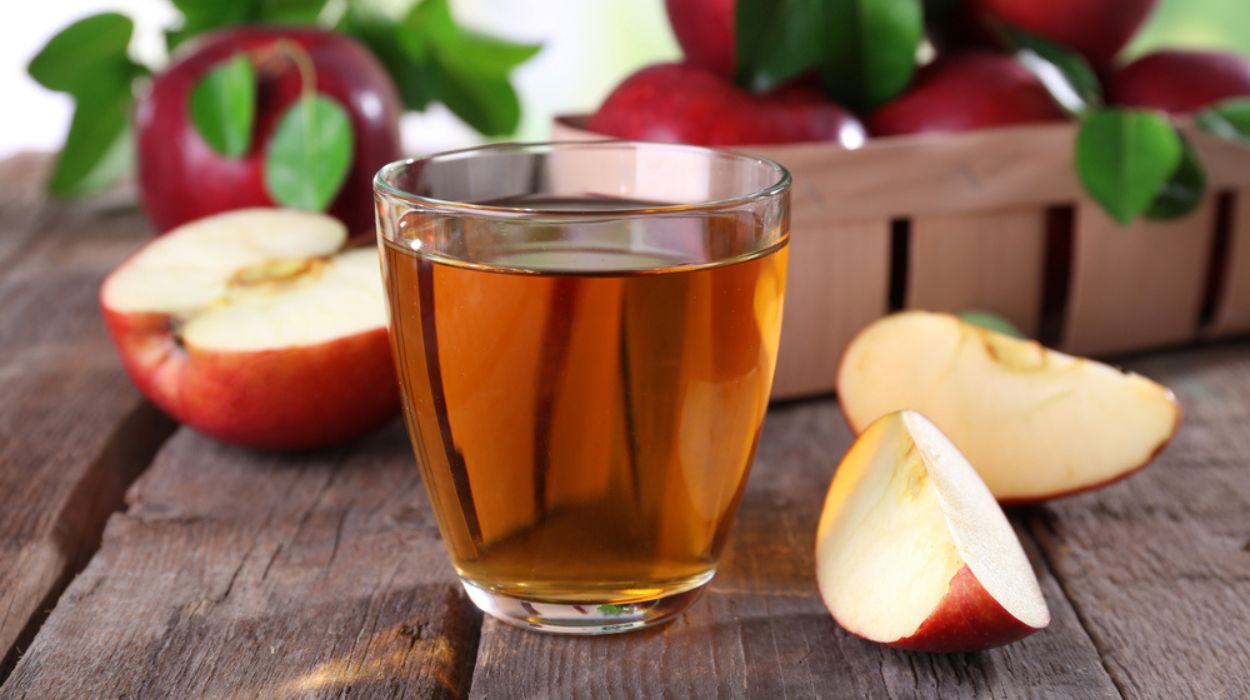Apple juice is the second most consumed juice[1] worldwide after orange juice. Experts disagree on the health benefits of apple juice. On one hand, apple juice contains concentrated amounts of phytonutrients,[2] offering potent health benefits; on the other hand, juicing causes a loss of other nutrients, making juice a non-equivalent replacement for whole fruits.
Is apple juice good for weight loss? This is hard to answer and the research is unclear. We explain the health and weight loss benefits of consuming apple juice and offer suggestions for healthy consumption habits.
Can You Lose Weight By Drinking Apple Juice?
Potentially. Apple juice is a controversial beverage when it comes to weight loss — some believe the concentrated sugar can lead to weight gain while others claim that naturally occurring sugar from fruit juice does not pose the same health risks as added sugar.
Apple juice’s weight loss benefits may be limited. Still, consumed in moderation, apple juice may be beneficial as part of a healthy diet.
Is Apple Juice Good For Weight Loss?

It can be but research provides different perspectives on whether apple juice either supports or inhibits weight loss. Scientists agree on the similarities between sugar-sweetened beverages and fruit juice. However, naturally occurring sugars and added sugars may not pose[3] the same health consequences.
Pros
Animal studies suggest that apple juice consumption is not harmful[4] for weight. Reductions in body weight[5] were found among participants who consumed apple juice.
Furthermore, consuming only juice — a juice cleanse[6] — for three days positively affects weight loss. Changes in the gut microbiome can lead to continued weight loss even after ending a juice cleanse. However, note that, in this study, participants also consumed a low-calorie diet.
Cons
While juicing fruit can concentrate its nutrients, it removes[7] most of the fiber. One large apple contains 5.35 grams[8] of fiber, yet there is less than one gram of fiber[8] in a cup of apple juice. Fiber slows gastric emptying and increases satiety,[9] which supports weight loss.
Additionally, one cup of apple juice contains almost 24 grams of sugar. Reducing sugar is a key strategy[10] for weight loss and management. Consuming apple juice provides a high concentration of sugar, without any fiber to compensate.
Nutrient, fiber, and sugar content will differ slightly from a large apple to a medium apple. Still, juicing concentrates the sugar and removes fiber.
How Does Apple Juice Affect Your Weight?
It’s difficult to say conclusively how apple juice affects weight — there are many variables to consider when trying to lose weight. These include your general health, activity level, and the frequency and amount of apple juice consumed.
Consuming small amounts of apple juice on a low-calorie diet may support weight loss in some. However, consuming large amounts of fruit juice increases sugar intake. It is unclear if 100% fruit juice[11] sugar has the same weight gain consequences as added sugar.
Nutrition experts agree that, on the whole, when consumed in moderation and as part of a healthy diet, fruit juice holds more health benefits[12] than risks. This is especially true when comparing the natural sugars in apple juice to added sugars.
A study conducted on rodents demonstrated the harmless[4] effects of natural sugar, even in rodents with diabetes. However, these findings only suggest potential health benefits and do not guarantee weight loss, specifically.
How To Use Apple Juice To Lose Weight
Unlike apple cider vinegar, which is fermented apple juice, apple juice can be consumed undiluted. However, there are other considerations for consuming apple juice to support better health and weight loss.
Dilute Apple Juice
Dilute apple juice in water. This will provide more hydration and less sugar.
Drink In Moderation
Regardless of whether apple juice sugar is less harmful than added sugar, it’s still sugar. Additionally, apple juice contains no fiber[13] to support weight loss. Therefore, consume in small amounts.
Replace Sugar-Sweetened Beverages With Apple Juice
Apple juice may contain sugar, but it is less harmful[12] than added sugar commonly found in soda and iced tea. If you’re trying to reduce sugar, start by replacing all sugar-sweetened beverages with 100% juice.
Buy 100% Juice
Some fruit juice has added sugar — this is the sugar you want to avoid! When shopping for fruit juice, check the ingredients on the back of the label. Make sure the only ingredient in your apple juice is apples.
Drink Apple Juice With A Meal
Avoid drinking apple juice on an empty stomach. Since apple juice has no fiber,[13] it can be beneficial to drink it with a meal that does contain fiber. This will help reduce blood sugar spikes,[14] and the body can absorb the sugar more slowly.
Work With A Registered Dietician
Rather than experimenting alone, work with a professional who can support your weight loss journey. If diet and exercise are not enough, they may prescribe weight loss pills or fat burners to help increase weight loss.
Other Benefits Of Apple Juice

How is apple juice good for you? If using apple juice to replace sugar-sweetened beverages, apple juice, and apples are good for weight loss. However, they offer other health benefits, too.
Apple juice is high in vitamin C and several other antioxidants.[12] Apple juice may reduce oxidative stress[2] as well as the risk of cardiovascular disease. And despite its high natural sugar content, apple juice is not associated[15] with an increased risk of diabetes.
Consider consuming apples and apple juice along with other drinks and fruits for weight loss.
Potential Side Effects
Apples are considered a high-fodmap food, due to their fructose[16] content. The fructose in apples may trigger IBS symptoms, causing some individuals to experience gastrointestinal upset.
Over-consuming apple juice can lead to ingesting excess fructose. While the fructose found in apples is less harmful than added sugar, it can still lead to weight gain.[17] Apple juice is not considered fattening, per se, but with overconsumption, it may increase body fat.
Some studies have found that increased amounts of apple juice[18] may also increase asthma in children. However, it is unclear if similar results are known in adults.
If side effects of apple juice deter you from drinking it, focus on other healthful foods and lifestyle habits that can support weight loss. If necessary, consult a doctor or registered dietician about taking diet pills.
Conclusion
Apple juice is a popular fruit juice consumed worldwide. In moderation, it may support a healthy weight as many studies are unable to draw a direct link between apple juice and weight gain. However, the excess sugar and lack of fiber in apple juice may hinder its weight loss effects.
On the whole, 100% apple juice is healthier and more weight loss-friendly than sugar-sweetened beverages. When trying to lose weight, it’s okay to enjoy modest amounts of apple juice as part of an overall healthy diet.
Frequently Asked Questions
Yes. For the most health benefits, consume 100% apple juice with no added sugar and drink it with a meal that contains fiber.
No. There is no direct evidence that apple juice targets belly fat.
It’s okay to drink apple juice once in a while for weight loss. However, you may find better results by drinking vegetable juices which contain less sugar than fruit juices.
It’s best to consume apple juice with a meal containing fiber. Apple juice contains very little, if any, fiber, so drinking it on its own can spike blood sugar.
Yes. While both soda and apple juice contain sugar, apple juice contains natural sugars. Sugary beverages like soda, contain added sugar, which is more detrimental to health and weight loss.
Yes. All you need are a juicer and apples! Fresh apple juice made at home is always a great option.
 Evidence Based
Evidence Based
